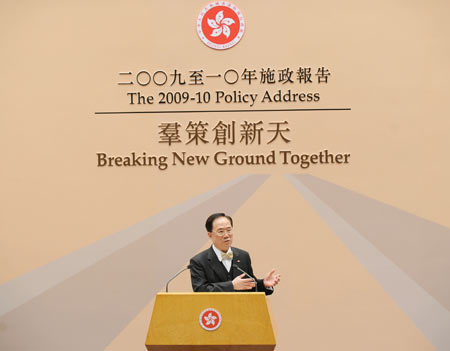HK chief delivers annual policy address
Hong Kong Special Administrative Region (HKSAR) Chief Executive Donald Tsang delivered Wednesday an annual policy address at the Legislative Council, outlining government efforts in the coming year.
In the address titled "Breaking New Ground Together," Tsang said Hong Kong was hit hard by the global financial turmoil and the economic downturn but the Hong Kong people "have done a great job in keeping the ship afloat."
"I am confident that, for the rest of the year, our economy will improve further and gradually recover," he said.
 |
|
Chief Executive of the Hong Kong Special Administrative Region (HKSAR) Donald Tsang Yam-kuen holds a press conference after delivering his 2009-10 policy address at the Legislative Council in south China's Hong Kong, Oct. 14, 2009. [Xinhua] |
Hong Kong, one of the freest economies in the world, recorded sharp declines in its GDP and external trade during the downturn. It reversed four quarters of contraction in the second quarter to record a quarter-on-quarter growth of 3.3 percent, boosted by forceful stimulus and benefiting from the strength of the mainland economy.
Tsang said challenges remained ahead for Hong Kong to maintain its status as a global financial center and increase its competitiveness as a trade center.
"Hong Kong must constantly enhance its competitiveness and continue to evolve into a high value-added, knowledge-based economy to maintain its leading edge over global competitors and create more quality jobs," he said.
Tsang outlined plans to promote the innovation and knowledge- based industries, particularly the six industries recommended earlier by a task force, such as education services, medical services, testing and certification, environmental industries, innovation and technology, and cultural and creative industries.
The innovation and knowledge-based industries also include traditional pillars such as financial services, tourism, trading and logistics, and professional services.
"We must try every means to enhance the flow of people, goods, capital and information that are related to the four pillar industries," he said.
In terms of the financial services industry, Tsang said the plan was to continue to develop Hong Kong as a global financial center, asset management center and offshore Renminbi business center while meeting the development needs of China.
Hong Kong's roles as a testing ground for the gradual opening up of the Chinese financial industry and as a capital raising center will be strengthened, he said.
Tsang also said measures were being discussed to facilitate the mainland visitor traveling to Hong Kong. He pledged to continue pressing ahead with the construction of the new cruise terminal at Kai Tak, where an airport used to located.
In terms of trade and logistics, he said Hong Kong will work closely with the mainland authorities to maintain its leading position in the global supply chain. The city also has an important role to play in the blueprint for the Pearl River Delta region.
The HKSAR government has also identified permanent sites close to the container terminals and airport to facilitate the shift to high-value goods and services.
Access to mainland market in professional services, where Hong Kong also has a clear advantage, will be facilitated, Tsang said in the 90-minute address.
Land use will be optimized to boost the six industries where Hong Kong enjoys a clear advantage.
Measures will be considered or put in place to allow more students from the Chinese mainland and other places to receive education at senior high schools and higher education institutions in Hong Kong.
In a move to support the medical services industry, Tsang said the government planed to invite Expressions of Interest from the market to develop private hospitals on four sites by the end of the year. Standard setting will also speed up for Chinese herbal medicines.
The HKSAR government will allocate about 200 million HK dollars (25.6 million U.S. dollars) to launch a "R&D Cash Rebate Scheme," under which eligible enterprises may enjoy a cash rebate equivalent to 10 percent of their investments, Tsang said.
Tsang outlined plans to boost, among others, creative industries, environmental industries and cooperation with the neighboring Guangdong province in the policy address. Healthcare, cultural conservation and anti-drug campaign were also covered.
Tsang said Hong Kong is a city of immigrants and "a free, pluralistic, advanced and civilized society" and that the integration between Hong Kong and the Pearl River Delta would speed up in the next decade.
"We are entering a new era, but we need not be worried about the new competitive landscape. With an open mind, pioneering spirit, and full preparation, we can break new ground together," he said.
News
· HK to pursue active exchanges with Taiwan
· HK to improve services for disabled and mentally-impaired
· HK to step up effort to make the city greener
· HK to allocate 200 mln HKD to promote R&D
· HK to use hair drug testing to tackle juvenile drug abuse
· HK will fine-tune land supply when necessary
· HK to enhance financial regulation to protect investors
· HK to enhance regional education hub status
· HK to enhance competitiveness as global financial center
· HK to push ahead with private hospital development
·HK to consult public on supplementary healthcare financing proposal
· HK to speed up subsidized nursing home provision for elderly
 0
0 






